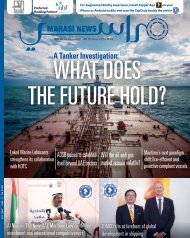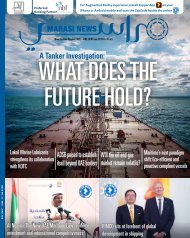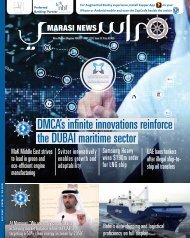Marasi 28
You also want an ePaper? Increase the reach of your titles
YUMPU automatically turns print PDFs into web optimized ePapers that Google loves.
EXPERT VIEW<br />
Shipping industry to witness<br />
key trends in 2030<br />
By Kirsi Tikka<br />
ABS Executive Vice<br />
President & Senior<br />
Maritime Advisor<br />
Given the fast pace of technological development, it is<br />
not truly possible to forecast the future in detail, even<br />
for as little as 10 years. However, we can confidently<br />
make predictions that are extrapolated from the trends<br />
we see developing today. The shipping industry will be<br />
transformed by increased automation, data, connectivity<br />
and improved analytics capabilities, as well as digital alternatives<br />
to commercial transactions.<br />
There are two key drivers of technological development:<br />
regulations and financial sustainability. By 2030, the<br />
industry will be working to reach the target of reducing<br />
GHG emissions per cargo transport by 70%. This will<br />
be achieved with a mix of advances in ship technology,<br />
improved efficiency of ship operations, new low carbon<br />
fuels and propulsion alternatives, as well as market based<br />
measures.<br />
Prospects of shipping 2030<br />
The ship built today will still be viable but may benefit<br />
from or require retrofits. In 2030, most vessels will have<br />
joined the Internet of Things, and be part of the Internet<br />
of Ships. This will entail increased connectivity to shore<br />
and a focus on a more efficient operation of the fleet, not<br />
only the individual vessel.<br />
Other new technologies to watch include additive manufacturing,<br />
or 3D printing. Combining it with increased<br />
reliability and robustness of systems and predictive/preventative<br />
maintenance could introduce a step change to<br />
inventory management of spares, and ship maintenance<br />
and operations.<br />
Commercial trading platforms, block chain technology<br />
and crypto currencies will be introduced to transform and<br />
optimize the logistics chain in some shipping sectors. This<br />
transformation is likely to take place in advance of the<br />
major changes in ship design and technology. All these<br />
changes will require regulatory changes and extensive<br />
product development and innovation. New advances in<br />
technology must have even better safety and environmental<br />
performance than is expected of shipping operations<br />
today. If the transformation is implemented diligently,<br />
then it will leave shipping a more efficient, safer<br />
and more responsible industry than it is today.<br />
Predictive vetting and vessel rating will have a solid<br />
foundation<br />
Classification will use dynamic condition data to assist<br />
survey planning and to make surveys less disruptive and<br />
condition based rather than calendar based.This kind of<br />
real-time vessel performance data combined with data<br />
analytics and machine learning will underpin a range of<br />
decisions in the future, whether by regulators, charterers,<br />
or rating organizations.<br />
As a consequence of the increasingly pivotal role of<br />
vessel data, understanding and planning how the data is<br />
collected and used, data quality and cyber security will all<br />
be foundational elements to be considered from design<br />
to operations.<br />
Many of the new technologies supporting regulatory<br />
compliance as well as cost reductions will result from<br />
autonomous ship development projects, but the application<br />
of those technologies will not require new ships.<br />
64 MAY - JUNE 2018


















